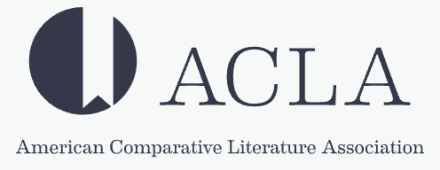Dan Burns, assistant professor of English, recently presented at the American Comparative Literature Association’s annual meeting, held this year at the Palais des congrès de Montreal from March 14-17.
Dan Burns, assistant professor of English, recently presented at the American Comparative Literature Association’s annual meeting, held this year at the Palais des congrès de Montreal from March 14-17.
Burns, who is co-coordinator of the Global Film & Cultures minor, was a panelist at this year’s American Comparative Literature Association conference—the principal learned society in the United States for cross-cultural literary study and scholars that teach and write across nations, languages, and cultures.
The three-day seminar, titled Writerly Worlds and Worldly Writers: Transcultural Receptions of German Literature, explored how various nations, cultures, translations, and technologies shape the reception aesthetics (Rezeptionsästhetik) of German-language texts and writers.
 Burns’ paper examined American writer-director Orson Welles’ 1962 film Le Procès (1962), an adaptation of the celebrated 1925 novel The Trial (Der Prozeß) by the Czech-German author Franz Kafka. A French, Italian, and West German co-production, Welles’ adaptation was met with a notoriously negative reception in its original release but has enjoyed a critical reevaluation in recent years. Following the recent turn in Kafka scholarship to a focus on European visual culture and experimental psychology in the author’s work, Burns analyzed Welles’ cinematic approach to the competing cognitive demands of attention and distraction in Kafka’s novel through innovations in mobile framing, continuity editing, and deep focus compositions.
Burns’ paper examined American writer-director Orson Welles’ 1962 film Le Procès (1962), an adaptation of the celebrated 1925 novel The Trial (Der Prozeß) by the Czech-German author Franz Kafka. A French, Italian, and West German co-production, Welles’ adaptation was met with a notoriously negative reception in its original release but has enjoyed a critical reevaluation in recent years. Following the recent turn in Kafka scholarship to a focus on European visual culture and experimental psychology in the author’s work, Burns analyzed Welles’ cinematic approach to the competing cognitive demands of attention and distraction in Kafka’s novel through innovations in mobile framing, continuity editing, and deep focus compositions.
The American Comparative Literature Association (ACLA) promotes the study of intercultural relations that cross national boundaries, multicultural relations within a particular society, and the interactions between literature and other forms of human activity, including the arts, the sciences, philosophy, and cultural artifacts of all kinds.



